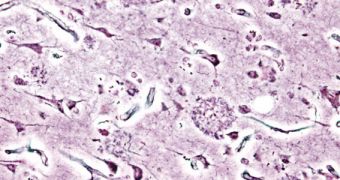A team of investigators with the Center for Memory Disorders (CMD) at the Stanford University argue in a new study that one of the genes previously associated with the development and evolution of Alzheimer's disease may pose more dangers to women than men, thus accounting for the higher incidence that this neurodegenerative form of dementia has among female patients.
Scientists have been trying to determine the root causes of this difference for quite a long time, but thus far their efforts have been foiled by the intricate mechanisms underlying Alzheimer's. The new research finally made some strides forward, revealing that the APOE4 gene – which is known to increase dementia risks in both men and women – has a lesser influence on male patients.
Details of the new study appear in the April 14 issue of the medical journal Annals of Neurology. The main conclusion of the work is that APOE4 doubles the risk of developing Alzheimer's in women, while the same risk increases just marginally in men. The same association was found for a less dangerous form of dementia, called mild cognitive impairment (MCI), NPR reports.
The latest official statistics appear to indicate that as many as 5 million people suffer from Alzheimer's in the United States alone. Of those numbers, nearly 67 percent are accounted for by women, highlighting a huge difference between genders in terms of vulnerability to developing dementia.
“We believe that there is an increased risk for Alzheimer's in women, and it may be that APOE4 is playing a sizable role in this,” says the head of the CMD, Michael Greicius, who was also one of the authors on the new study. One reason why more women than men develop this type of dementia is that they are more likely to live long enough to display the symptoms.
Greicius explains that the new study was conducted based on the assumption that more than longevity influenced this disparity in reported cases between men and women. As early as the 1990s, scientists have suggested that APOE4 may play a role in this difference, and the CMD research appears to support this claim, adding that the gene may in fact be one of the most important factors at play here.
“What is interesting in relation to this paper is that animal and cellular studies suggest that there is an interaction between APOE4 and estrogen. So that may possibly be explaining the findings we're seeing here in humans,” explains Mayo Clinic psychiatric epidemiologist Michelle Mielke.
The investigation also highlights some of the ways women can use to reduce their risk of developing Alzheimer's. “We say what's good for your heart is good for your brain. So exercise, controlling hypertension, cholesterol, eating right, doing physical activities are all important for your cognitive function,” Mielke concludes.

 14 DAY TRIAL //
14 DAY TRIAL //